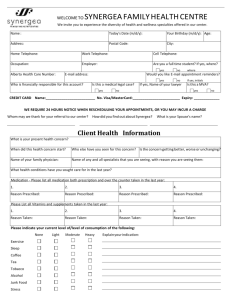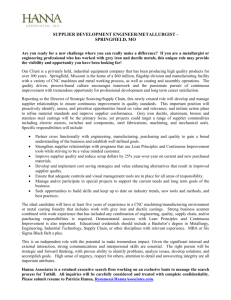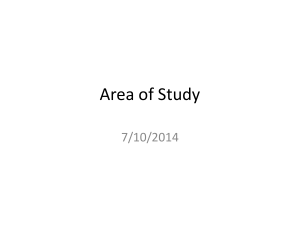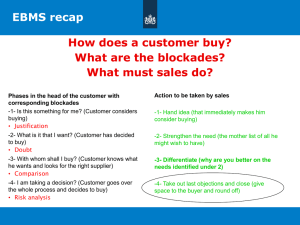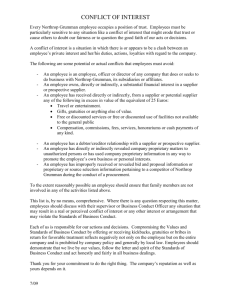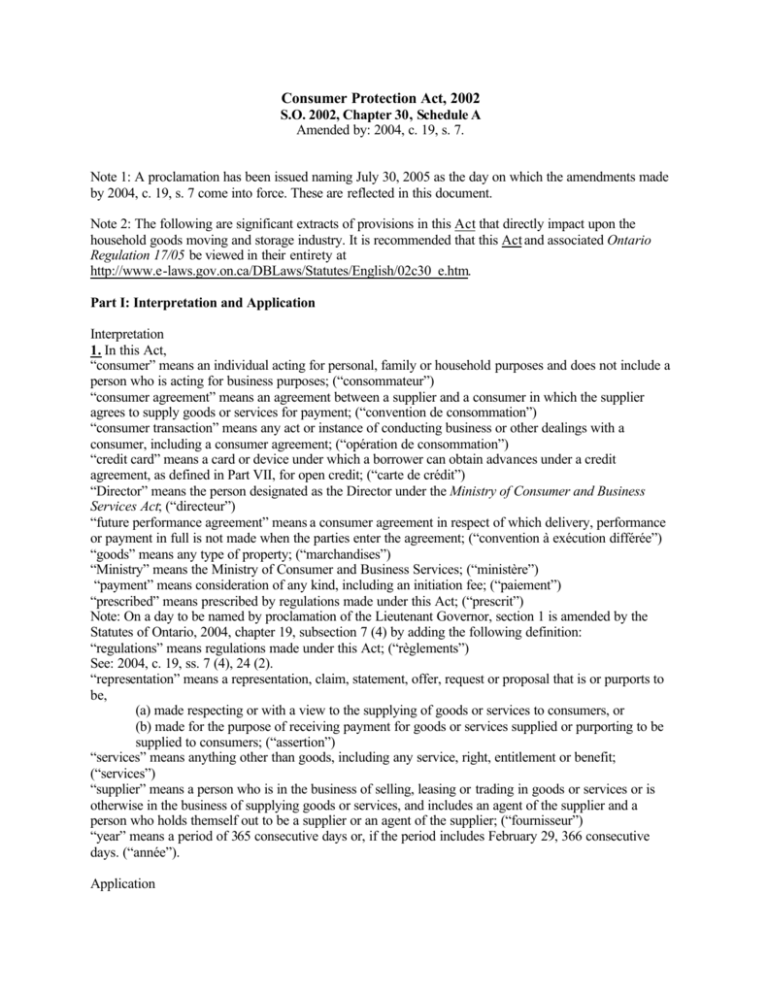
Consumer Protection Act, 2002
S.O. 2002, Chapter 30, Schedule A
Amended by: 2004, c. 19, s. 7.
Note 1: A proclamation has been issued naming July 30, 2005 as the day on which the amendments made
by 2004, c. 19, s. 7 come into force. These are reflected in this document.
Note 2: The following are significant extracts of provisions in this Act that directly impact upon the
household goods moving and storage industry. It is recommended that this Act and associated Ontario
Regulation 17/05 be viewed in their entirety at
http://www.e-laws.gov.on.ca/DBLaws/Statutes/English/02c30_e.htm.
Part I: Interpretation and Application
Interpretation
1. In this Act,
“consumer” means an individual acting for personal, family or household purposes and does not include a
person who is acting for business purposes; (“consommateur”)
“consumer agreement” means an agreement between a supplier and a consumer in which the supplier
agrees to supply goods or services for payment; (“convention de consommation”)
“consumer transaction” means any act or instance of conducting business or other dealings with a
consumer, including a consumer agreement; (“opération de consommation”)
“credit card” means a card or device under which a borrower can obtain advances under a credit
agreement, as defined in Part VII, for open credit; (“carte de crédit”)
“Director” means the person designated as the Director under the Ministry of Consumer and Business
Services Act; (“directeur”)
“future performance agreement” means a consumer agreement in respect of which delivery, performance
or payment in full is not made when the parties enter the agreement; (“convention à exécution différée”)
“goods” means any type of property; (“marchandises”)
“Ministry” means the Ministry of Consumer and Business Services; (“ministère”)
“payment” means consideration of any kind, including an initiation fee; (“paiement”)
“prescribed” means prescribed by regulations made under this Act; (“prescrit”)
Note: On a day to be named by proclamation of the Lieutenant Governor, section 1 is amended by the
Statutes of Ontario, 2004, chapter 19, subsection 7 (4) by adding the following definition:
“regulations” means regulations made under this Act; (“règlements”)
See: 2004, c. 19, ss. 7 (4), 24 (2).
“representation” means a representation, claim, statement, offer, request or proposal that is or purports to
be,
(a) made respecting or with a view to the supplying of goods or services to consumers, or
(b) made for the purpose of receiving payment for goods or services supplied or purporting to be
supplied to consumers; (“assertion”)
“services” means anything other than goods, including any service, right, entitlement or benefit;
(“services”)
“supplier” means a person who is in the business of selling, leasing or trading in goods or services or is
otherwise in the business of supplying goods or services, and includes an agent of the supplier and a
person who holds themself out to be a supplier or an agent of the supplier; (“fournisseur”)
“year” means a period of 365 consecutive days or, if the period includes February 29, 366 consecutive
days. (“année”).
Application
Consumer Protection Act, 2002
S.O. 2002, Chapter 30, Schedule A
Amended by: 2004, c. 19, s. 7.
2. (1) Subject to this section, this Act applies in respect of all consumer transactions if the consumer or
the person engaging in the transaction with the consumer is located in Ontario when the transaction takes
place.
Disclosure of information
5. (1) If a supplier is required to disclose information under this Act, the disclosure must be clear,
comprehensible and prominent.
Delivery of information
(2) If a supplier is required to deliver information to a consumer under this Act, the information must, in
addition to satisfying the requirements in subsection (1), be delivered in a form in which it can be retained
by the consumer.
PART II: Consumer Rights and Warranties
Rights reserved
6. Nothing in this Act shall be interpreted to limit any right or remedy that a consumer may have in law.
No waiver of substantive and procedural rights
7. (1) The substantive and procedural rights given under this Act apply despite any agreement or waiver
to the contrary.
Limitation on effect of term requiring arbitration
(2) Without limiting the generality of subsection (1), any term or acknowledgment in a consumer
agreement or a related agreement that requires or has the effect of requiring that disputes arising out of the
consumer agreement be submitted to arbitration is invalid insofar as it prevents a consumer from
exercising a right to commence an action in the Superior Court of Justice given under this Act.
Class proceedings
8. (1) A consumer may commence a proceeding on behalf of members of a class under the Class
Proceedings Act, 1992 or may become a member of a class in such a proceeding in respect of a dispute
arising out of a consumer agreement despite any term or acknowledgment in the consumer agreement or a
related agreement that purports to prevent or has the effect of preventing the consumer from commencing
or becoming a member of a class proceeding.
Quality of services
9. (1) The supplier is deemed to warrant that the services supplied under a consumer agreement are of a
reasonably acceptable quality.
Estimates
10. (1) If a consumer agreement includes an estimate, the supplier shall not charge the consumer an
amount that exceeds the estimate by more than 10 per cent.
Performance of consumer agreement
(2) If a supplier charges an amount that exceeds the estimate by more than 10 per cent, the consumer may
require that the supplier provide the goods or services at the estimated price.
Consumer Protection Act, 2002
S.O. 2002, Chapter 30, Schedule A
Amended by: 2004, c. 19, s. 7.
Subsequent agreement
(3) Nothing in this section prevents a consumer and a supplier from agreeing to amend the estimate or
price in a consumer agreement, if the consumer requires additional or different goods or services.
Ambiguities to benefit consumer
11. Any ambiguity that allows for more than one reasonable interpretation of a consumer agreement
provided by the supplier to the consumer or of any information that must be disclosed under this Act shall
be interpreted to the benefit of the consumer.
Charging consumers for assistance
12. No person shall charge a consumer for assisting the consumer to obtain any benefit, right or protection
to which the consumer is entitled under this Act, unless, before the consumer agrees to pay the charge, the
person discloses the entitlement’s existence and direct availability to the consumer and the cost, if any,
the consumer would be required to pay for the entitlement if the consumer obtained the entitlement
directly.
Unsolicited goods or services: relief from legal obligations
13. (1) Except as provided in this section, a recipient of unsolicited goods or services has no legal
obligation in respect of their use or disposal.
No payment for unsolicited goods or services
(2) No supplier shall demand payment or make any representation that suggests that a consumer is
required to make payment in respect of any unsolicited goods or services despite their use, receipt,
misuse, loss, damage or theft.
Request not inferred
(3) A request for goods or services shall not be inferred solely on the basis of payment, inaction or the
passing of time.
Material change deemed unsolicited
(4) If a consumer is receiving goods or services on an ongoing or periodic basis and there is a material
change in such goods or services, the goods or services shall be deemed to be unsolicited from the time of
the material change forward unless the supplier is able to establish that the consumer consented to the
material change.
Form of consent
(5) A supplier may rely on a consumer’s consent to a material change that is made orally, in writing or by
other affirmative action but the supplier shall bear the onus of proving the consumer’s consent.
Demand
(6) If a supplier has received a payment in respect of unsolicited goods or services, the consumer who
made the payment may demand a refund of the payment in accordance with section 92 within one year
after having made the payment.
Refund
Consumer Protection Act, 2002
S.O. 2002, Chapter 30, Schedule A
Amended by: 2004, c. 19, s. 7.
(7) A supplier who receives a demand for a refund under subsection (6) shall refund the payment within
the prescribed period of time. [See Ontario Regulation 17/05, s.21 – the prescribed period of time is
within 15 days after the consumer demands the refund.]
Definition
(9) In this section,
“unsolicited goods or services” means,
(a) goods that are supplied to a consumer who did not request them but does not include,
(i) goods that the recipient knows or ought to know are intended for another person,
(ii) a change to periodically supplied goods, if the change in goods is not a material
change, or
(iii) goods supplied under a written future performance agreement that provides for the
periodic supply of goods to the recipient without further solicitation, or
(b) services that are supplied to a consumer who did not request them but does not include,
(i) services that were intended for another person from the time the recipient knew or
ought to have known that they were so intended,
(ii) a change to ongoing or periodic services that are being supplied, if the change in the
services is not a material change, or
(iii) services supplied under a written future performance agreement that provides for the
ongoing or periodic supply of services to the recipient without further solicitation.
PART III: Unfair Practices
False, misleading or deceptive representation
14. (1) It is an unfair practice for a person to make a false, misleading or deceptive representation.
Examples of false, misleading or deceptive representations
(2) Without limiting the generality of what constitutes a false, misleading or deceptive representation, the
following are included as false, misleading or deceptive representations:
1. A representation that the goods or services have sponsorship, approval, performance
characteristics, accessories, uses, ingredients, benefits or qualities they do not have.
2. A representation that the person who is to supply the goods or services has sponsorship,
approval, status, affiliation or connection the person does not have.
3. A representation that the goods or services are of a particular standard, quality, grade, style or
model, if they are not.
4. A representation that the goods are new, or unused, if they are not or are reconditioned or
reclaimed, but the reasonable use of goods to enable the person to service, prepare, test and
deliver the goods does not result in the goods being deemed to be used for the purposes of this
paragraph.
5. A representation that the goods have been used to an extent that is materially different from the
fact.
6. A representation that the goods or services are available for a reason that does not exist.
7. A representation that the goods or services have been supplied in accordance with a previous
representation, if they have not.
8. A representation that the goods or services or any part of them are available or can be delivered
or performed when the person making the representation knows or ought to know they are not
available or cannot be delivered or performed.
Consumer Protection Act, 2002
S.O. 2002, Chapter 30, Schedule A
Amended by: 2004, c. 19, s. 7.
9. A representation that the goods or services or any part of them will be available or can be
delivered or performed by a specified time when the person making the representation knows or
ought to know they will not be available or cannot be delivered or performed by the specified
time.
10. A representation that a service, part, replacement or repair is needed or advisable, if it is not.
11. A representation that a specific price advantage exists, if it does not.
12. A representation that misrepresents the authority of a salesperson, representative, employee or
agent to negotiate the final terms of the agreement.
13. A representation that the transaction involves or does not involve rights, remedies or
obligations if the representation is false, misleading or deceptive.
14. A representation using exaggeration, innuendo or ambiguity as to a material fact or failing to
state a material fact if such use or failure deceives or tends to deceive.
15. A representation that misrepresents the purpose or intent of any solicitation of or any
communication with a consumer.
16. A representation that misrepresents the purpose of any charge or proposed charge.
17. A representation that misrepresents or exaggerates the benefits that are likely to flow to a
consumer if the consumer helps a person obtain new or potential customers.
Unconscionable representation
15. (1) It is an unfair practice to make an unconscionable representation.
Same
(2) Without limiting the generality of what may be taken into account in determining whether a
representation is unconscionable, there may be taken into account that the person making the
representation or the person’s employer or principal knows or ought to know,
(a) that the consumer is not reasonably able to protect his or her interests because of disability,
ignorance, illiteracy, inability to understand the language of an agreement or similar factors;
(b) that the price grossly exceeds the price at which similar goods or services are readily available
to like consumers;
(c) that the consumer is unable to receive a substantial benefit from the subject-matter of the
representation;
(d) that there is no reasonable probability of payment of the obligation in full by the consumer;
(e) that the consumer transaction is excessively one-sided in favour of someone other than the
consumer;
(f) that the terms of the consumer transaction are so adverse to the consumer as to be inequitable;
(g) that a statement of opinion is misleading and the consumer is likely to rely on it to his or her
detriment; or
(h) that the consumer is being subjected to undue pressure to enter into a consumer transaction.
Renegotiation of price
16. It is an unfair practice for a person to use his, her or its custody or control of a consumer’s goods to
pressure the consumer into renegotiating the terms of a consumer transaction.
Unfair practices prohibited
17. (1) No person shall engage in an unfair practice.
One act deemed practice
Consumer Protection Act, 2002
S.O. 2002, Chapter 30, Schedule A
Amended by: 2004, c. 19, s. 7.
(2) A person who performs one act referred to in section 14, 15 or 16 shall be deemed to be engaging in
an unfair practice.
Rescinding agreement
18. (1) Any agreement, whether written, oral or implied, entered into by a consumer after or while a
person has engaged in an unfair practice may be rescinded by the consumer and the consumer is entitled
to any remedy that is available in law, including damages.
Remedy if rescission not possible
(2) A consumer is entitled to recover the amount by which the consumer’s payment under the agreement
exceeds the value that the goods or services have to the consumer or to recover damages, or both, if
rescission of the agreement under subsection (1) is not possible,
See: 2004, c. 19, ss. 7 (6), 24 (2).
(a) because the return or restitution of the goods or services is no longer possible; or
(b) because rescission would deprive a third party of a right in the subject-matter of the agreement
that the third party has acquired in good faith and for value.
Notice
(3) A consumer must give notice within one year after entering into the agreement if,
(a) the consumer seeks to rescind an agreement under subsection (1); or
(b) the consumer seeks recovery under subsection (2), if rescission is not possible.
Form of notice
(4) The consumer may express notice in any way as long as it indicates the intention of the consumer to
rescind the agreement or to seek recovery where rescission is not possible and the reasons for so doing
and the notice meets any requirements that may be prescribed.
Delivery of notice
(5) Notice may be delivered by any means.
When notice given
(6) If notice is delivered other than by personal service, the notice shall be deemed to have been given
when sent.
Address
(7) The consumer may send or deliver the notice to the person with whom the consumer contracted at the
address set out in the agreement or, if the consumer did not receive a written copy of the agreement or the
address of the person was not set out in the agreement, the consumer may send or deliver the notice,
(a) to any address of the person on record with the Government of Ontario or the Government of
Canada; or
(b) to an address of the person known by the consumer.
Commencement of an action
(8) If a consumer has delivered notice and has not received a satisfactory response within the prescribed
period, the consumer may commence an action.
Same
Consumer Protection Act, 2002
S.O. 2002, Chapter 30, Schedule A
Amended by: 2004, c. 19, s. 7.
(9) If a consumer has a right to commence an action under this section, the consumer may commence the
action in the Superior Court of Justice.
Evidence
(10) In the trial of an issue under this section, oral evidence respecting an unfair practice is admissible
despite the existence of a written agreement and despite the fact that the evidence pertains to a
representation in respect of a term, condition or undertaking that is or is not provided for in the
agreement.
Exemplary damages
(11) A court may award exemplary or punitive damages in addition to any other remedy in an action
commenced under this section.
Liability
(12) Each person who engaged in an unfair practice is liable jointly and severally with the person who
entered into the agreement with the consumer for any amount to which the consumer is entitled under this
section.
Limited liability of assignee
(13) If an agreement to which subsection (1) or (2) applies has been assigned or if any right to payment
under such an agreement has been assigned, the liability of the person to whom it has been assigned is
limited to the amount paid to that person by the consumer.
Effect of rescission
(14) When a consumer rescinds an agreement under subsection (1), such rescission operates to cancel, as
if they never existed,
(a) the agreement;
(b) all related agreements;
(c) all guarantees given in respect of money payable under the agreement;
(d) all security given by the consumer or a guarantor in respect of money payable under the
agreement; and
(e) all credit agreements, as defined in Part VII, and other payment instruments, including
promissory notes,
(i) extended, arranged or facilitated by the person with whom the consumer reached the
agreement, or
(ii) otherwise related to the agreement.
Waiver of notice
(15) If a consumer is required to give notice under this Part in order to obtain a remedy, a court may
disregard the requirement to give the notice or any requirement relating to the notice if it is in the interest
of justice to do so.
Transition
19. (1) This Part applies to consumer transactions that occur on or after the day this section is proclaimed
in force.
Same
Consumer Protection Act, 2002
S.O. 2002, Chapter 30, Schedule A
Amended by: 2004, c. 19, s. 7.
(2) The Business Practices Act, as it existed immediately before its repeal by the Consumer Protection
Statute Law Amendment Act, 2002, continues to apply to consumer transactions that occurred before its
repeal.
PART IV: Rights and Obligations Respecting Specific Consumer Agreements
Definitions and Application
Interpretation
20. (1) In this Part,
“direct agreement” means a consumer agreement that is negotiated or concluded in person at a place other
than,
(a) at the supplier’s place of business, or
(b) at a market place, an auction, trade fair, agricultural fair or exhibition; (“convention directe”)
“internet” means the decentralized global network connecting networks of computers and similar devices
to each other for the electronic exchange of information using standardized communication protocols;
(“Internet”)
“internet agreement” means a consumer agreement formed by text-based internet communications;
(“convention électronique”)
“remote agreement” means a consumer agreement entered into when the consumer and supplier are not
present together; (“convention à distance”)
Limitations on cancellation
(2) Despite sections 95 and 96, in the prescribed circumstances, the effect of cancellation of a consumer
agreement to which this Part applies by a consumer and the obligations arising as a result of the
cancellation of the agreement may be subject to such limitations as may be prescribed.
Future Performance Agreements
Application of sections
21. (1) Sections 22 to 26 apply to future performance agreements if the consumer’s total potential
payment obligation under the agreement, excluding the cost of borrowing, exceeds a prescribed amount.
[See Ontario Regulation 17/05, s.23 – the prescribed amount is $50.]
Exception
(2) Sections 22 to 26 do not apply to agreements that are future performance agreements solely because of
an open credit arrangement.
Transition
(3) Sections 22 to 26 apply to future performance agreements entered into on or after the day this section
is proclaimed in force.
Same
(4) The Consumer Protection Act, as it existed immediately before its repeal under the Consumer
Protection Statute Law Amendment Act, 2002, continues to apply to executory contracts entered into
before its repeal.
Consumer Protection Act, 2002
S.O. 2002, Chapter 30, Schedule A
Amended by: 2004, c. 19, s. 7.
Requirements for future performance agreements
22. Every future performance agreement shall be in writing, shall be delivered to the consumer and shall
be made in accordance with the prescribed requirements. [See Ontario Regulation 17/05, s.24 for the
prescribed content of a future performance agreement.]
Cancelling future performance agreements
23. A consumer may cancel a future performance agreement within one year after the date of entering into
the agreement if the consumer does not receive a copy of the agreement that meets the requirements
required by section 22.
Rights in other goods not enforceable
24. Any provision in any future performance agreement or in any security agreement incidental to such an
agreement under which the supplier may acquire title to, possession of or any rights in any goods of the
consumer, other than the goods passing to the consumer under the agreement, is not enforceable.
No repossession after two-thirds paid except by leave of court
25. (1) Where a consumer under a future performance agreement has paid two-thirds or more of his or her
payment obligation as fixed by the agreement, any provision in the agreement, or in any security
agreement incidental to the agreement, under which the supplier may retake possession of or resell the
goods or services upon default in payment by the consumer is not enforceable except by leave obtained
from the Superior Court of Justice.
Powers of court
(2) Upon an application for leave under subsection (1), the court may, in its discretion, grant leave to the
supplier or refuse leave or grant leave upon such terms and conditions as the court considers advisable.
Late delivery
26. (1) A consumer may cancel a future performance agreement at any time before delivery under the
agreement or the commencement of performance under the agreement if the supplier,
(a) does not make delivery within 30 days after the delivery date specified in the agreement or an
amended delivery date agreed to by the consumer in writing; or
(b) does not begin performance of his, her or its obligations within 30 days after the
commencement date specified in the agreement or an amended commencement date agreed to by
the consumer in writing.
Delivery or commencement date not specified
(2) If the delivery date or commencement date is not specified in the future performance agreement, a
consumer may cancel the agreement at any time before delivery or commencement if the supplier does
not deliver or commence performance within 30 days after the date the agreement is entered into.
Forgiveness of failure
(3) If, after the period in subsection (1) or (2) has expired, the consumer agrees to accept delivery or
authorize commencement, the consumer may not cancel the agreement under this section.
Deemed delivery or performance
(4) For the purposes of subsections (1) and (2), a supplier is considered to have delivered or commenced
performance under a future performance agreement if,
Consumer Protection Act, 2002
S.O. 2002, Chapter 30, Schedule A
Amended by: 2004, c. 19, s. 7.
(a) delivery was attempted but was refused by the consumer at the time that delivery was
attempted or delivery was attempted but not made because no person was available to accept
delivery for the consumer on the day for which reasonable notice was given to the consumer that
there was to be delivery; or
(b) commencement was attempted but was refused by the consumer at the time that
commencement was attempted or commencement was attempted but did not occur because no
person was available to enable commencement on the day for which reasonable notice was given
to the consumer that commencement was to occur.
Internet Agreements
Application
37. Sections 38 to 40 apply to an internet agreement if the consumer’s total potential payment obligation
under the agreement, excluding the cost of borrowing, exceeds a prescribed amount. [See Ontario
Regulation 17/05, s.31 – the prescribed amount is $50.]
Disclosure of information
38. (1) Before a consumer enters into an internet agreement, the supplier shall disclose the prescribed
information to the consumer. [See Ontario Regulation 17/05, s.32 for the prescribed information to be
disclosed.]
Express opportunity to accept or decline agreement
(2) The supplier shall provide the consumer with an express opportunity to accept or decline the
agreement and to correct errors immediately before entering into it.
Manner of disclosure
(3) In addition to the requirements set out in section 5, disclosure under this section shall be accessible
and shall be available in a manner that ensures that,
(a) the consumer has accessed the information; and
(b) the consumer is able to retain and print the information.
Copy of internet agreement
39. (1) A supplier shall deliver to a consumer who enters into an internet agreement a copy of the
agreement in writing within the prescribed period after the consumer enters into the agreement. [See
Ontario Regulation 17/05, ss.33(1) – the prescribed period is 15 days after the consumer enters into the
agreement.]
Content of internet agreement
(2) The copy of the internet agreement shall include such information as may be prescribed. [See Ontario
Regulation 17/05, ss.33(2) for the prescribed content of the internet agreement.]
Deemed supply of internet agreement
(3) For the purposes of subsection (1), a supplier is considered to have delivered a copy of the internet
agreement to the consumer if the copy is delivered in the prescribed manner. [See Ontario Regulation
17/05, ss.33(3) for the prescribed manner of delivery.]
Cancellation of internet agreement
Consumer Protection Act, 2002
S.O. 2002, Chapter 30, Schedule A
Amended by: 2004, c. 19, s. 7.
40. (1) A consumer may cancel an internet agreement at any time from the date the agreement is entered
into until seven days after the consumer receives a copy of the agreement if,
(a) the supplier did not disclose to the consumer the information required under subsection 38 (1);
or
(b) the supplier did not provide to the consumer an express opportunity to accept or decline the
agreement or to correct errors immediately before entering into it.
Same
(2) A consumer may cancel an internet agreement within 30 days after the date the agreement is entered
into, if the supplier does not comply with a requirement under section 39.
Direct Agreements
Application
41. (1) Sections 42 and 43 apply to direct agreements if the consumer’s total potential payment
obligations under the agreement, excluding the cost of borrowing, exceeds a prescribed amount. [See
Ontario Regulation 17/05, s.34 – the prescribed amount is $50.]
Transition
(2) Sections 42 and 43 apply to direct agreements entered into on or after the day this section is
proclaimed in force.
Same
(3) The Consumer Protection Act, as it existed immediately before its repeal by the Consumer Protection
Statute Law Amendment Act, 2002, continues to apply to direct sales contracts entered into before its
repeal.
Requirements for direct agreements
42. Every direct agreement shall be in writing, shall be delivered to the consumer and shall be made in
accordance with the prescribed requirements. [See Ontario Regulation 17/05, s.35 for the prescribed
content of the direct agreement.]
Cancellation: cooling-off period
43. (1) A consumer may, without any reason, cancel a direct agreement at any time from the date of
entering into the agreement until 10 days after receiving the written copy of the agreement.
Cancellation: failure to meet requirements
(2) In addition to the right under subsection (1), a consumer may cancel a direct agreement within one
year after the date of entering into the agreement if the consumer does not receive a copy of the
agreement that meets the requirements under section 42.
Remote Agreements
Application
44. Sections 45 to 47 apply to remote agreements if the consumer’s total potential payment obligation
under the agreement, excluding the cost of borrowing, exceeds a prescribed amount. [See Ontario
Regulation 17/05, s.36 – the prescribed amount is $50.]
Consumer Protection Act, 2002
S.O. 2002, Chapter 30, Schedule A
Amended by: 2004, c. 19, s. 7.
Disclosure of information
45. Before a consumer enters into a remote agreement, the supplier shall disclose the prescribed
information to the consumer and shall satisfy the prescribed requirements. [See Ontario Regulation 17/05,
s.37 for the prescribed information to be disclosed, and s.38 for the prescribed requirements that must be
satisfied.]
Copy of remote agreement
46. (1) A supplier shall deliver to a consumer who enters into a remote agreement a copy of the agreement
in writing within the prescribed period after the consumer enters into the agreement. [See Ontario
Regulation 17/05, ss.39(1) – for the prescribed period.]
Content of remote agreement
(2) The copy of the remote agreement shall include such information as may be prescribed. . [See Ontario
Regulation 17/05, ss.39(2) for the prescribed content of the remote agreement.]
Deemed supply of remote agreement
(3) For the purposes of subsection (1), a supplier is considered to have delivered a copy of the remote
agreement to the consumer if the copy is delivered in the prescribed manner. [See Ontario Regulation
17/05, ss.39(3) for the prescribed manner of delivery.]
Cancellation of remote agreement
47. (1) A consumer may cancel a remote agreement at any time from the date the agreement is entered
into until seven days after the consumer receives a copy of the agreement if the supplier fails to comply
with section 45.
Same
(2) A consumer may cancel a remote agreement within one year after the date the agreement is entered
into, if the supplier does not comply with a requirement under section 46.
PART IX: Procedures for Consumer Remedies
Application
91. This Part does not apply to remedies claimed in respect to unfair practices under Part III.
Form of consumer notice
92. (1) If this Act requires a consumer to give notice to a supplier to request a remedy, the consumer may
do so by giving notice in accordance with this section.
Same
(2) The notice may be expressed in any way, as long as it indicates the intention of the consumer to seek
the remedy being requested and complies with any requirements that may be prescribed.
Giving notice
(3) Unless the regulations require otherwise, the notice may be oral or in writing and may be given by any
means.
Consumer Protection Act, 2002
S.O. 2002, Chapter 30, Schedule A
Amended by: 2004, c. 19, s. 7.
Notice given when sent
(4) If notice in writing is given other than by personal service, the notice shall be deemed to be given
when sent.
Address
(5) The consumer may send or deliver the notice to the address set out in a consumer agreement or, if the
consumer did not receive a written copy of a consumer agreement or the address was not set out in the
written agreement, the consumer may send or deliver the notice,
(a) to any address of the supplier on record with the Government of Ontario or the Government of
Canada; or
(b) to an address of the supplier known by the consumer.
Court may order consumer bound
(2) Despite subsection (1), a court may order that a consumer is bound by all or a portion or portions of a
consumer agreement, even if the agreement has not been made in accordance with this Act or the
regulations, if the court determines that it would be inequitable in the circumstances for the consumer not
to be bound.
Cancellation
94. (1) If a consumer has a right to cancel a consumer agreement under this Act, the consumer may cancel
the agreement by giving notice in accordance with section 92.
Effective time
(2) The cancellation takes effect when the consumer gives notice.
Effect of cancellation
95. The cancellation of a consumer agreement in accordance with this Act operates to cancel, as if they
never existed,
(a) the consumer agreement;
(b) all related agreements;
(c) all guarantees given in respect of money payable under the consumer agreement;
(d) all security given by the consumer or a guarantor in respect of money payable under the
consumer agreement; and
(e) all credit agreements, as defined in Part VII, and other payment instruments, including
promissory notes,
(i) extended arranged or facilitated by the person with whom the consumer reached the
consumer agreement, or
(ii) otherwise related to the consumer agreement.
Obligations on cancellation
96. (1) If a consumer cancels a consumer agreement, the supplier shall, in accordance with the prescribed
requirements,
(a) refund to the consumer any payment made under the agreement or any related agreement; and
(b) return to the consumer in a condition substantially similar to when they were delivered all
goods delivered under a trade-in arrangement or refund to the consumer an amount equal to the
trade-in allowance. 2002, c. 30, Sched. A, s. 96 (1).
Consumer Protection Act, 2002
S.O. 2002, Chapter 30, Schedule A
Amended by: 2004, c. 19, s. 7.
Repossession or return of goods
(2) Upon cancelling a consumer agreement, the consumer, in accordance with the prescribed requirements
and in the prescribed manner, shall permit the goods that came into the consumer’s possession under the
agreement or a related agreement to be repossessed, shall return the goods or shall deal with them in such
manner as may be prescribed.
Reasonable care
(3) If a consumer cancels a consumer agreement, the consumer shall take reasonable care of the goods
that came into the possession of the consumer under the agreement or a related agreement for the
prescribed period.
To whom obligation owed
(4) The consumer owes the obligation described in subsection (3) to the person entitled to possession of
the goods at the time in question.
No further obligation
(5) Compliance with this section discharges the consumer from all obligations relating to the goods and
the consumer is under no other obligation, whether arising by contract or otherwise, to take care of the
goods.
Right of action
(6) If a consumer has cancelled a consumer agreement and the supplier has not met the supplier’s
obligations under subsection (1), the consumer may commence an action.
Same
(7) If a consumer has cancelled a consumer agreement and has not met the consumer’s obligations under
this section, the supplier or the person to whom the obligation is owed may commence an action.
Illegal charges and payments
98. (1) If a supplier has charged a fee or an amount in contravention of this Act or received a payment in
contravention of this Act, the consumer who paid the charge or made the payment may demand a refund
by giving notice in accordance with section 92 within one year after paying the charge or making the
payment.
Supplier to provide refund
(2) A supplier who receives a notice demanding a refund under subsection (1) shall provide the refund
within the prescribed period of time.
Right of action
(3) The consumer may commence an action in accordance with section 100 to recover,
(a) the payment of a fee or an amount that was charged by the supplier in contravention of this
Act; or
(b) a payment that was received by the supplier in contravention of this Act.
Non-supplier
(4) This section and section 92 apply, with the necessary modifications, to a person who is not a supplier,
if the person has received a payment in contravention of section 12.
Consumer Protection Act, 2002
S.O. 2002, Chapter 30, Schedule A
Amended by: 2004, c. 19, s. 7.
Consumer’s recourse re: credit card charges
99. (1) A consumer who has charged to a credit card account all or any part of a payment described in
subsection (2) may request the credit card issuer to cancel or reverse the credit card charge and any
associated interest or other charges.
Types of payment
(2) Subsection (1) applies to,
(a) a payment in respect of a consumer agreement that has been cancelled under this Act or in
respect of any related agreement;
(b) a payment that was received in contravention of this Act;
(c) a payment in respect of a fee or an amount that was charged in contravention of this Act; and
(d) a payment that was collected in respect of unsolicited goods or services for which payment is
not required under section 13.
Timing of request
(3) A consumer may make a request under subsection (1) if the consumer has cancelled a consumer
agreement or demanded a refund in accordance with this Act, and the supplier has not refunded all of the
payment within the required period.
Request
(4) A request under subsection (1) shall be in writing, shall comply with the requirements, if any, that are
prescribed under subsection 92 (2), and shall be given to the credit card issuer, in the prescribed period, in
accordance with section 92.
Obligations of credit card issuer
(5) The credit card issuer,
(a) shall, within the prescribed period, acknowledge the consumer’s request; and
(b) if the request meets the requirements of subsection (4), shall, within the prescribed period,
(i) cancel or reverse the credit card charge and any associated interest or other charges, or
(ii) after having conducted an investigation, send a written notice to the consumer
explaining the reasons why the credit card issuer is of the opinion that the consumer is
not entitled to cancel the consumer agreement or to demand a refund under this Act.
Right of action
(6) A consumer may commence an action against a credit card issuer to recover a payment and associated
interest and other charges to which the consumer is entitled under this section.
Other prescribed payment systems
(7) If a consumer charges all or part of a payment described in subsection (2) to a prescribed payment
system, the consumer may request that the charge be cancelled or reversed and this section applies with
necessary modifications to the cancellation or reversal of such a charge.
Action in Superior Court of Justice
100. (1) If a consumer has a right to commence an action under this Act, the consumer may commence
the action in the Superior Court of Justice.
Consumer Protection Act, 2002
S.O. 2002, Chapter 30, Schedule A
Amended by: 2004, c. 19, s. 7.
Judgment
(2) If a consumer is successful in an action, unless in the circumstances it would be inequitable to do so,
the court shall order that the consumer recover,
(a) the full payment to which he or she is entitled under this Act; and
(b) all goods delivered under a trade-in arrangement or an amount equal to the trade-in allowance.
Same
(3) In addition to an order under subsection (2), the court may order exemplary or punitive damages or
such other relief as the court considers proper.
Waiver of notice
101. If a consumer is required to give notice under this Act in order to obtain a remedy, a court may
disregard the requirement to give the notice or any requirement relating to the notice if it is in the interest
of justice to do so.




